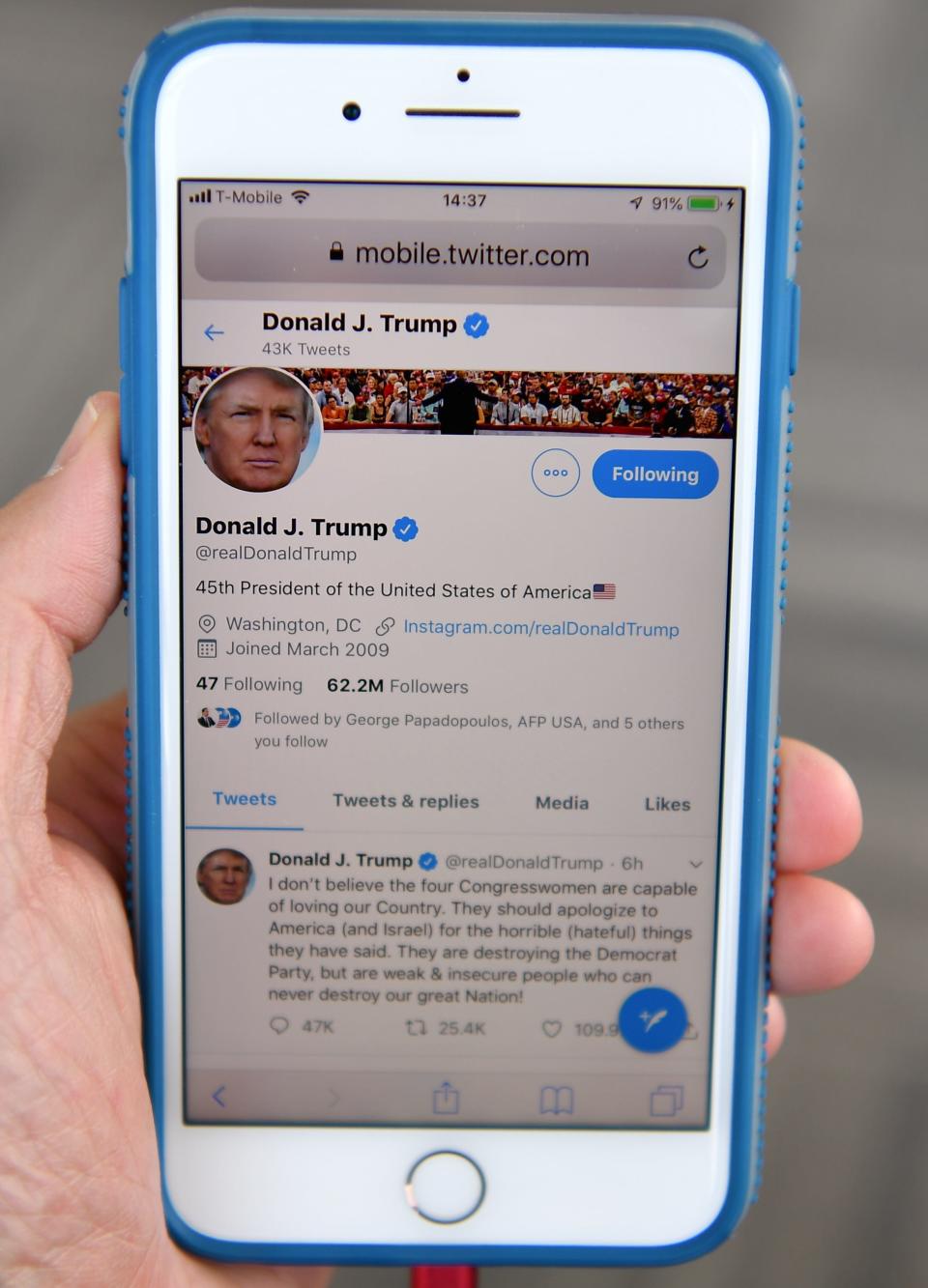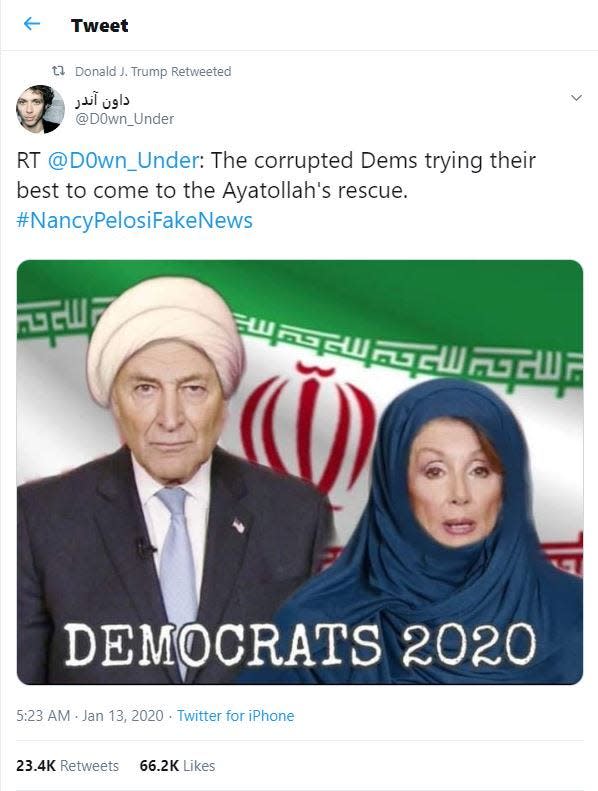Don't downplay Donald Trump's toxic tweets. A president's words are never a sideshow.
President Donald Trump has been at it again, using his Twitter feed to pump out a toxic stream of consciousness that aims to create a sense of shock and awe. Before 11 a.m. on Monday, he misspelled Sen. Bernie Sanders' name and a smear of Sen. Elizabeth Warren, confused the words “eminent” and “imminent,” falsely claimed to be protecting health insurance his administration is trying to kill, and retweeted a doctored image of House Speaker Nancy Pelosi and Senate Democratic leader Chuck Schumer wearing Islamic head garb in front of an Iranian flag. “The corrupted Dems trying their best to come to the Ayatollah’s rescue,” read the tweet, in case anyone didn’t get the message.
Just another day in the Oval Office.
Of course, this was not the first time the president has unleashed horrendous images and words through his infamous social media account. Indeed, the entire history of the Trump presidency might one day be told through the angry tweet blasts that we have suffered through since the start of his term, with racist, Islamophobic and sexist rhetoric becoming commonplace on the bully pulpit.
How should the news media react? The question will be especially important as the 2020 campaign heats up and the incentives for Trump to act badly will only intensify.
Nasty tweets key part of Trump record
It is true, as critics of the coverage note, that with these tweets the president often aims to distract the public from something controversial and to shape the national conversation in ways that play to his famous base. The tweets have been a blunt political instrument to attack and delegitimize opponents. Trump intentionally provokes, knowing that it is difficult for journalists to avoid the shiny object. The king of reality television understands that one way to keep attracting viewers is to make the content as sensational as possible.
Some Republicans, feeling defensive, have made a similar argument. Utah Sen. Mitt Romney, asked about the retweet of Schumer and Pelosi, responded: “If I reacted to all of the president’s tweets that I disagreed with, that’s all I would spend my time doing. So this isn’t one I’m going to rise to the bait on.”
But it would be a mistake for the news media to turn away. While these sorts of tweets should not consume the entire news cycle, they must be part of the conversation. The tweets and retweets are a key part of his presidential record. Because they come from the president, these short blasts are serious business.

Presidential rhetoric is never a side show. The great presidents, such as Abraham Lincoln and Franklin Roosevelt, elevated the nation through lofty prose that inspired citizens to survive through difficult times. In our textbooks, we chronicle moments such as FDR’s speech on Dec. 8, 1941, when he mobilized the public after the devastating Japanese attacks on Pearl Harbor. It was, FDR famously said, a date that would “live in infamy.”
Following the brutal attacks on civil rights marchers in Selma, Alabama, in 1965, Lyndon Johnson put the full weight of his presidency behind the cause of voting rights, delivering a stirring address to Congress in which he used the slogan of the civil rights movement, “We shall overcome.”
In 1986, Ronald Reagan helped comfort a devastated citizenry who had watched the space shuttle Challenger explode in midair — with a school teacher inside. “We will never forget them, nor the last time we saw them,” Reagan said, “this morning, as they prepared for their journey and waved goodbye and ‘slipped the surly bonds of earth’ to ‘touch the face of God.’ ”
When presidents speak in ways that degrades our institutions, such as the release of transcripts showing how much Richard Nixon cursed and insulted different minority groups, they undercut public confidence in the office.
Twitter tirades are Nixon on steroids
The current president has managed to move our public discourse in a negative direction, like Nixon but on steroids. He keeps lowering the bar as to what is permissible for political leaders to say and sets a negative role model in terms of how a politician who likes partisan division can intentionally stoke our social fractures through blistering words and images. With each tweet, he makes it more permissible for future presidents and other leaders to follow in his footsteps. He establishes a rhetorical precedent that can be followed as the public loses its sense of shock.
Many of our leaders have been wrestling with how to make our national politics less destructive while increasing the potential for constructive civic interaction. The president’s Twitter tirades make that task that much more difficult to imagine.

Through the tweets, Trump also pours fuel into the reactionary elements of American politics that remain much stronger than many people had hoped back in November 2008, when voters elected the first African American president. Regardless of what Trump’s own feelings might be, his tweets give Americans who traffic in Islamophobia, racism, nativism, anti-Semitism and sexism reason to believe that their way of speaking about others is legitimate. After all, if the president does it, then it must be OK.
The presidential Twitter feed must be taken seriously. It needs to be treated the same way that historians treat other kinds of presidential proclamations, such as formal speeches, news conferences and published statements. When students in the future conduct research in the American Presidency Project, the tweets will be a substantial part of what they find.
As much as the media can’t be distracted by the tweets into ignoring important political and policy developments, neither can they be distracted from forgetting just how unprecedented and unpresidential this social media feed has been, and how dangerous it is to our political institutions. Words are consequential, and presidential rhetoric has the stamp of approval of the highest office in the land.
One of the great risks from the Trump presidency is that we become comfortably numb to what he has been saying and typing, and the many ways his words erode the strength of our democracy.
Julian E. Zelizer is a political historian at Princeton University and the author of "Burning Down the House: Newt Gingrich, the Fall of a Speaker, and the Rise of the New Republican Party," which will be published April 28. Follow him on Twitter: @JulianZelizer
You can read diverse opinions from our Board of Contributors and other writers on the Opinion front page, on Twitter @usatodayopinion and in our daily Opinion newsletter. To respond to a column, submit a comment to letters@usatoday.com.
This article originally appeared on USA TODAY: Trump's toxic tweets set a dangerous and unpresidential precedent

